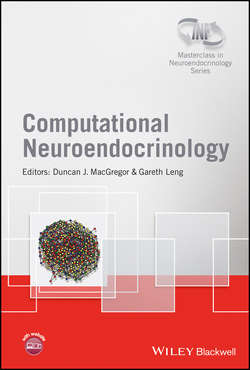Описание книги
Neuroendocrinology with its well defined functions, inputs, and outputs, is one of the most fertile grounds for computational modeling in neuroscience. But modeling is often seen as something of a dark art. This book aims to display the power of modeling approaches in neuroendocrinology, and to showcase its potential for understanding these complex systems. A recurring theme in neuroendocrinology is rhythms. How are rhythms generated, and what purpose do they serve? Are these two questions inextricably intertwined? This book is written for innocents, presuming no math beyond high school or computing beyond calculators. It seeks to lead the curious into the thinking of the modeler, providing the tools to the reader to understand models, and even develop their own, giving life to paper diagrams. The diverse chapters, from ion channels to networks, systems, and hormonal rhythms, each tell the story of a model serving to join the hard won dots of experimentation, mapping a new understanding, and revealing hidden knowledge. • Written by a team of internationally renowned researchers • Both print and enhanced e-book versions are available • Illustrated in full colour throughout This is the fourth volume in a new Series ‘Masterclass in Neuroendocrinology’ , a co- publication between Wiley and the INF (International Neuroendocrine Federation) that aims to illustrate highest standards and encourage the use of the latest technologies in basic and clinical research and hopes to provide inspiration for further exploration into the exciting field of neuroendocrinology. Series Editors: John A. Russell, University of Edinburgh, UK and William E. Armstrong, The University of Tennessee, USA • Written by a team of internationally renowned researchers • Both print and enhanced e-book versions are available • Illustrated in full colour throughout This is the fourth volume in a new Series ‘Masterclass in Neuroendocrinology’ , a co- publication between Wiley and the INF (International Neuroendocrine Federation) that aims to illustrate highest standards and encourage the use of the latest technologies in basic and clinical research and hopes to provide inspiration for further exploration into the exciting field of neuroendocrinology. Series Editors: John A. Russell, University of Edinburgh, UK and William E. Armstrong, The University of Tennessee, USA
